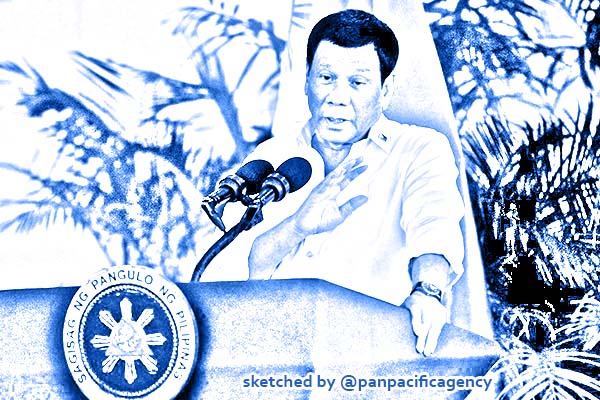Philippine leader Duterte trains guns on telcos

Philippine President Rodrigo Duterte. Photo: Reuters. Sketched by the Pan Pacific Agency.
MANILA, Jul 28, 2020, The Manila Times. President Rodrigo Duterte on Monday warned the country’s two giant telecommunications companies (telcos) that their assets would be seized if they did not improve their services by the end of the year, The Manila Times reported.
In his fifth State of the Nation Address (SONA), Duterte said the government would use the frequencies of Globe Telecom and Smart Communications to bring “uninterrupted, quality education” to students adjusting to the “new normal” amid the coronavirus pandemic.
The President said if need be, he would “revert to line telephone” service and “expropriate” the telcos’ frequencies during the last two years of his term, which ends in 2022.
“Don’t make us wait 10 years for services other countries are enjoying. Go and look for capital. If you are not ready to improve, I might as well close all of you; revert to line telephone. Kukunin ko ‘yan i-expropriate ko ‘yan (I will take it, I will expropriate it),” Duterte stressed.
“I’ll be straight. Smart pati itong Globe, ilang taon na ito? At ang sagot palagi sa akin, ‘The party cannot be reached’ (Smart and Globe, how long have you been around? And I get the same answer, ‘The party cannot be reached”), he said.
The President warned that the Filipinos’ patience with the telcos’ services was at its “limit.”
“You might not want what I intend to do with you. Kindly improve the services before December. I want to call Jesus Christ in Bethlehem, better have that line cleared,” he said.
“The next two years will be spent improving the telecommunications of the country without you. I will talk to Congress and find a way how to do it.”
He directed Justice Secretary Menardo Guevarra, Science and Technology Secretary Fortunato de la Peña and Information and Technology Secretary Gregorio Honasan to coordinate with Education Secretary Leonor Briones, Budget Secretary Wendel Avisado and Finance Secretary Carlos Dominguez 3rd to “come up with an integrated program and implementation, making sure that these TV frequencies are fully utilized by government.”
“The DepEd and the DICT are building up the Public Education Network, or PEN, that will connect all public schools and DepEd offices nationwide. We will prioritize the connection of all last-mile schools and those with no electricity supply and have it via satellite and energized by solar panels,” Duterte said, referring to the Department of Education and Department of Information and Communications Technology.
“In 2022, before I step down, the PEN shall be realized. I will do it,” the President added.
The Philippines is awaiting the entry of the third telecom player, Dito Telecommunity Corp., backed by businessman Dennis Uy, one of Duterte’s backers during his presidential bid in 2016.
In 2018, Duterte persistently attacked Globe and Smart that paved the way for an accelerated bidding for a third player hoping the new competition will prod the two telcos to improve their service.
In a statement after the SONA, Yoly Crisanto, Globe’s senior vice president for corporate communications, said the company would heed “the call of the President to improve telco services.”
She added that “service performance and increased consumer demand for data are the key reasons why we have been investing billions of dollars to upgrade and improve our network.”
Globe has earmarked $1.2 billion in capex, majority of which goes to network and capacity builds.
“These substantial investments are paying off as we experience marked service
improvements,” Crisanto said.
The Globe official noted that the long process of acquiring permits from local governments and national agencies “has hampered cellsite building and laying down of fiber to homes.”
During the pandemic, Globe had supported public and private hospitals, quarantine facilities and frontliners, Crisanto noted.
“We are working with the Department of Education to assist the sector through low-cost data plans and devices, as well as teacher training, online platforms and mental health support,” she said.